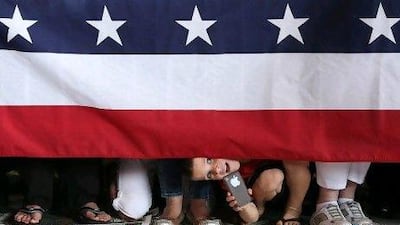WASHINGTON // It's been long, divisive and, above all, expensive.
The US presidential and congressional election campaigns are at a projected cost of US$5.8 billion (Dh21bn), set to be the most expensive in history - beating even the 2008 election that cost $5.4bn.
The new heights have been in part due to unprecedented spending from corporations and billionaire individuals. Their growing role has left some fearful that the wealthy have disproportionate influence over the US political process.
Fewer people are inclined to become involved if money is seen as the only way to be heard, said Elizabeth Rose of the Campaign for America's Future, a political organisation based in Washington DC.
"It's hard to get lower-income people excited about elections, in part because they believe it doesn't make a difference: the system is so rigged for the wealthy," Ms Rose said.
Some go further. Bernie Sanders, an independent senator from Vermont, in July warned Congress that "we are well on our way to seeing our great country move toward an oligarchic form of government - where virtually all economic and political power rest with a handful of very wealthy families".
Mr Sanders singled out a 2010 supreme court ruling that cleared the way for corporations and individuals to donate unlimited funds to so-called Super PACs.
Super PACs are non-affiliated political action committees that are not required to disclose their sources of funding and can throw their weight behind any campaign, as long as activities are not coordinated.
Their ability to do so was protected by free speech, contended the supreme court, in a five-to-four ruling.
And Super PACs have exercised that right to the fullest. They have spent $628 million, mainly on TV advertising, in this year's campaigns, pushing independent election spending to nearly five times the levels of 2008, the non-partisan Centre for Responsive Politics (CRP) says.
The result has been an avalanche of negative ads, particularly in key election states such as Florida and Virginia, said Susan McManus, a professor of political science at the University of South Florida.
"The Super-PACs have been able to either drown a candidate or float one," said Prof McManus.
By not being required to disclose their sources of funding, they have provided a "quick way to get a lot of money into a race without a lot of attention", she said.
The amount of money in US politics is staggering, even without Super-PAC spending. The presidential race is costing over $2bn, the CRP says.
The centre estimates the average cost of running for a seat in the House of Representatives is $1m, while a Senate seat can cost as much as $10m.
American politicians are also personally wealthy. Barack Obama made a small fortune on the back of royalties from three best-selling books that supplement his annual salary of about $400,000. His net worth is between $2.8m and $11.8m.
That dwindles compared with Mitt Romney, his Republican challenger, who has a net worth between $80m and $254m, according to 2011 disclosure reports that US law requires presidential candidates to file.
And he is not the only politician in America's richest 1 per cent. Fifty-seven members of the US Congress are members of that group, says CRP, and the rest are not doing too badly either. Congress has 250 millionaires and a median net worth of about $890,000.
Politics is becoming a rich man's game, said Prof McManus.
"It takes a lot of money to run," she said. And the creation of Super-PACs has just meant that the more money you have "the louder a voice you have".
In July, Mr Sanders in the Senate identified 26 billionaires, including Sheldon Adelson, the gambling magnate, and the Walton family, which owns the Walmart chain of stores.
He said they were trying to buy this year's elections.
America's "democratic foundations," Mr Sanders said, "are now facing the most severe attacks, both economically and politically, that we have seen in the modern history of our country".
Prof McManus suggested the reality might be more complicated, with wealthy donors on both sides providing "somewhat" of a check.
"In a way, the fact that both sides have their Super-PACs have minimised the dominance of one over the other," she said.
But Ms Rose said the more money it cost to influence policy, the more it favoured the rich, and it diminished the inclination to change a system that hurt others.
"The middle class won't catch a break unless we curb the influence of big banks, big donors and corporate lobbyists," she said.
Mr Sanders has proposed a constitutional amendment to curb corporate spending on political campaigns, and overturn the court ruling. But there seems to be little political will for such reform.
In 2008, Mr Obama, a fresh-faced first-term senator from Chicago who rode a wave of enthusiasm and grassroots donations to the presidency, promised to pursue legislation that would control the influx of money into politics and set limits for the influence money could buy.
He did not, and now, if anything, money buys more influence in American politics.
"They all succumb to realities," said Prof McManus. "That's what happens."

